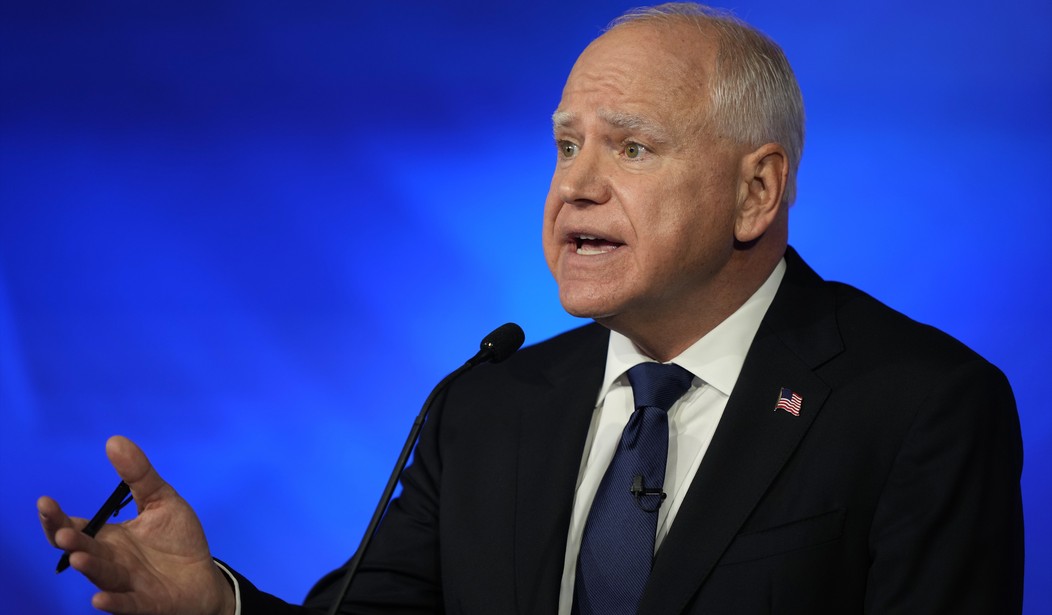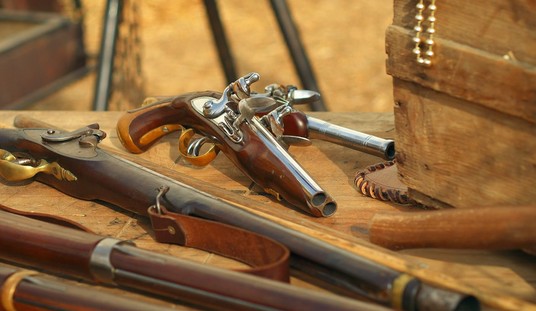When Kamala Harris tapped Tim Walz as her running mate, the conventional wisdom on the Left was that the Minnesota governor would help her campaign make inroads with rural voters and middle America. He's a hunter! He wears Carhartt! The rubes will love him!
It hasn't exactly worked out that way. After the Democrats forced Joe Biden off the ticket and anointed Harris as the handpicked candidate of the party establishment, Democrats did see a boost in the polls, but Harris is still struggling in key battleground states like Pennsylvania, Michigan, and Wisconsin, and Walz doesn't seem to be helping her connect with small town and rural voters.
POLITICO recently went to Walz's former congressional district to find out why so many of his own constituents have soured on him, and found plenty of folks eager to explain what's changed over the years.
I met Jeffrey in the field house overlooking the football field where Albert Lea’s high school football team, the Tigers, were getting beat. As the sun set over the far endzone, Jeffrey adjusted a window shade for a group of mostly older alumni watching from inside.
They weren’t exactly fans of the governor. There was Jim Munyer, the retired teacher I’d met at a Civil War Roundtable the previous night, who called Walz a “chameleon.” He suspected Walz was really more “California East, or California Midwest, I guess.”
There was Lowell Peterson, who told me over coffee earlier that day that when he saw Walz’s camo-print cap, all he saw was a desire to “be a friend to everybody.” And, he said, “I don’t like that crap, sucking up to everybody.”
And in a yellow safety vest by the concession stand, there was Mike Murtaugh, a former mayor of Albert Lea who, like a large number of people here voted for Barack Obama — and for Walz — before voting twice for Trump.Murtaugh, who was helping with parking at the game, said of Walz, “He plays himself as a former teacher from out-state Minnesota, but his base definitely seems to be more metro.” And in the stands not far from him, the current mayor of Albert Lea, Rich Murray, told me that while Harris and Walz won’t have trouble winning the state, “he’s not going to get the votes out here.”
And why is that? After all, Walz was elected to Congress in this rural district. So what's changed? Well, Walz, for one.
A former National Guardsman and public school teacher from small-town Nebraska, he’d cut a moderate profile in Washington with his support for the Keystone XL pipeline, his vote against the bank bailout in 2008 and his ‘A’ rating from the NRA.
Then, as governor — no longer representing a conservative-leaning House district, but a state where Democrats control the levers of government — he traded his old persona for a more progressive one, signing into law everything from universal background checks to free school lunches and protections for abortion and gender-affirming care. (The Republican insult “Tampon Tim” comes from a bill requiring public schools to provide their students access to menstrual products).
None of that played well in places like Freeborn County.
Walz, like Harris, has shown a propensity for flipping long-held positions when it's politically expedient to do so. During the vice presidential debate, Walz said that meeting with Sandy Hook parents changed his mind about a ban on so-called assault weapons, but he didn't come out in support for a gun ban after Sandy Hook in 2013. Instead, his first statements of support for a semi-auto ban coincided with his decision to run for governor several years later.
But as POLITICO points out, by the time Walz decided to run for statewide office his future in Congress was already in doubt. Though Walz won his first congressional campaign by 13 points, and captured 64% of the vote in the 2012 elections, by 2016 his star was fading, and he won re-election by less than 3,000 votes over his Republican challenger.
Though Walz still presented himself as a moderate Democrat, the hard left turn taken by the Democrat Party nationwide put Blue Dog Democrats in a bind. If they opposed the party on issues like gun control, they risked losing campaign cash from party stalwarts, but if they toed the party line they'd lose the respect of their rural base. A vote for Tim Walz wasn't just a vote for the candidate himself, it was a vote for Nancy Pelosi as House Speaker and the Democrats' far-left policies, and for many rural voters who'd previously supported "moderate" Democrats like Walz, that was a non-starter.
Consider Collin Peterson, the House Agriculture chair from the district neighboring Walz’s who was ousted in 2020 after 30 years in Congress. It’s hard to get more rural or conservative than Peterson, who didn’t support Trump’s impeachment and who voted in favor of gun rights and anti-abortion legislation.
“You’re wondering if in Freeborn County or some of these other counties, could any Democrat perform well?” Ostermeier said. “Well, eventually, even the 7th Congressional District turned on Collin Peterson, and he didn’t really change.”
“I think the voters changed,” he said. “And I would say this is the other aspect of it, is the willingness of voters to split their ticket has changed. Because I think with people in their [information] silos and increasingly characterizing the other side as evil, it’s difficult for people to say, well, there is this one good Democrat and I’m still going to vote for him, or there is this one good Republican … he’s not so bad.”
Ostermeier added, “Which is saying party over personality, I guess.”
The voters didn't change nearly as much as the Democrat Party did. In 2010, fully 25% of Democrats in Congress were "A"-rated by the National Rifle Association. But that number has steadily declined, and this year the only Democrat the NRA has endorsed for Congress is Alaska Rep. Mary Peltola.
Even as the number of gun-owning Democrats have increased, the party itself has become welded to the gun control lobby and its steady supply of Bloomberg Bucks spent in support of candidates who back policies that are non-starters with most rural Americans. The results have been a disaster for Democrats in rural districts, and no amount of camouflage hats or claims of gun ownership is going to undo the damage when the party itself is so hostile to our right to keep and bear arms.









Join the conversation as a VIP Member